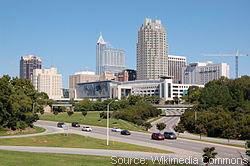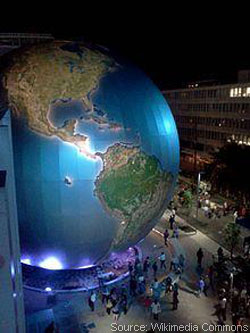 On three separate occasions in 2012, Forbes magazine rated Raleigh among the best American cities for its quality-of-life, employment and business opportunities.
On three separate occasions in 2012, Forbes magazine rated Raleigh among the best American cities for its quality-of-life, employment and business opportunities.
In April, the trade journal considered the capital of North Carolina 5th among the 10 Best Cities for Raising a Family. According to the tabloid, between crime rate, housing affordability, cost of living and several other factors, Raleigh was revered for its family friendly feeling.
In May, the magazine ranked Raleigh 40th out of 398 North American metropolitan areas for the Best Big Cities for Jobs. Almost 400 cities' growth trends were tracked for 12 years by the Bureau of Labor and Statistics, proving the city was a successful location to land a job.
In June, the periodical placed Raleigh 2nd among 25 Best Places for Business and Careers, noting the capital city's business costs are 18% below the national average.
And if that isn't enough, countless other trade journals such as GQ, Southern Living and Businessweek have given Raleigh two thumbs up for its top-notch living environment. To get an idea why the city is constantly making the news, take a look at this guide and decide for yourself if Raleigh is where you would like to relocate.
Raleigh Climate
The regional temperature of Raleigh is like many southern North American states. With a short, less cold winter season, the city has longer and hotter summer months. The coldest month of the year is January, averaging 31 degrees and the hottest month of the year is July, averaging 90 degrees. Intermittent periods of drought in the summer and possible hurricanes in the early fall are not too frequent in Raleigh, making the metropolis a quite comfortable and safe location to live.
With only a 6-inch average of snow in the winter, the city suffers no major winter storms. For those who could do without the snow, this is an attractive feature when considering relocation to Raleigh.
Raleigh neighborhoods
The Beltline, I-440, is a major highway that encircles the city's central area, making it an important route that separates Raleigh neighborhoods. Defined by downtown, North, South, East and West, the 145-square-mile city is separated by distinct demographics made up of old world and contemporary styles. The downtown City Market area was built up in the early 20th century and features both business and pleasure, with major commerce and cultural buildings right next door to one another.
 When moving to Raleigh, you are sure to find either employment or pleasure in the downtown area. However, North Raleigh is fast growing and made up of diverse subdivisions and shopping centers that offer excellent employment opportunities. South Raleigh is less dense with the private liberal arts university Shaw settled in the area, making the neighborhood an exceptional place to live and educate yourself.
When moving to Raleigh, you are sure to find either employment or pleasure in the downtown area. However, North Raleigh is fast growing and made up of diverse subdivisions and shopping centers that offer excellent employment opportunities. South Raleigh is less dense with the private liberal arts university Shaw settled in the area, making the neighborhood an exceptional place to live and educate yourself.
Near the Beltline, East Raleigh is a convenient area to settle in if you often travel the highway for work. New Hope and Wilder's Grove are a couple of quaint subdivisions that new residents may want to consider calling home. West Raleigh is home to North Carolina State University. The large institution, made up of almost 35,000 students, heavily populates the locale, making it a great place to live if you are a college resident or staff member of the state facility.
And, of course, one should feel safe in their neighborhood, which is not a problem in any area of the city. With six police districts and 27 fire stations, the city is surrounded by sworn officers, who have pledged to put their lives before the lives of Raleigh residents.
Registering Your Car
The Raleigh Division of Motor Vehicles is conveniently located in city, making it close and convenient when it is time to change over your license and registration. Though the website offers an array of online services, new residents will have to take a trip to the DMV to pick up a new license and registration.
When going to the DMV to change your license and registration, make sure to bring all of the necessary documents you need to switch over identification from your former state residence. You must bring two documents that provide your full name and birth date, one document proving your social security number, one document proving your new address and at least one document that proves you maintain liability insurance.
Registering your vehicle also requires documentation. You must be able to prove your vehicle taxes are paid, you have liability insurance and your car must be inspected. Though it seems like a lot of time and paperwork are needed to make Raleigh your new residence, it will be worth it when friends and family can say they have a loved one in North Carolina to visit!
Raleigh Schools
In 2011, U.S. News and World Report rated Raleigh as one of the 10 Most Educated Cities in the U.S., proving it is most definitely a place to move to if you have children of any age. Dozens of public, private and charter preschool, elementary, middle and high schools make up the education system throughout the city. The Raleigh School System can be researched, helping new residents decide what school best fits their family.
After receiving a K-12 education in Raleigh, students can transfer to any one of the universities in Research Triangle Park. As the largest research park in the world, the campuses and global centers that make it up are located in Raleigh, Durham and Chapel Hill. RTP is located between Duke University, North Carolina State University and the University of North Carolina. Having RTP in the region offers many educational and employment opportunities for anyone considering relocating to Raleigh.
Raleigh Employment
As noted earlier in the guide, Forbes, one of the world's top financial magazines, placed Raleigh among the top employable cities, saying the region offered the best business and career advantages in the area. Though the local unemployment rate, 7.6%, ranges only a few points under the national average, 7.9%, Raleigh is somehow successfully surviving the recession.
With 17 major employers in the city, any new resident is sure to find a prosperous position in the workplace. Key Companies are constantly accepting and reviewing applications for new employees in the area. If you haven't already landed a job in the region before you move, make sure to pack up your resume to start an exciting new career in Raleigh.
If you are not interested in working for the City of Raleigh, or in education at North Carolina State University, two major employers in the area, consider other Raleigh Jobs that can utilize your time and talent in the most efficient way for great pay.
Raleigh Moving Resources
Renting a truck to move to Raleigh may seem easy enough, but there is much more that goes into making a major life move. With so much to think of at once, it can become overwhelming to say the least. Prioritizing the moving tasks at hand is sure to help you. Moving from the suburbs to city living like Raleigh is quite a change and will take some time to adjust. Once you are ready to roll to Raleigh, take a deep breath and move in confidence knowing no matter where you end up in the city, you are exactly where you are supposed to be.
Living Costs in the City
With a 3.3% cost of living less than North Carolina and 6.7% lower than the national average, Raleigh promises to be a prosperous place to live. According to CNN Money, the median family income in Raleigh is right around $74,000. The journal also reported that median home price ranges around $170,000.
If you will be renting in Raleigh rather than owning your own home, you can expect to pay anywhere between $600 and $1,200 for an average one-year lease on a two-bedroom apartment. The vast difference in pricing is based on the apartment's location and quality, two factors that are important to consider when making a decision on a new place to live.
Raleigh Transportation
There are many way to get around Raleigh. Though many new residents choose to travel in their own vehicle on the Beltline, others choose to ride public transportation to take them from point A to B. Capital Area Transit takes residents throughout the city on 43 different bus routes. The city also offers the Raleigh Amtrak Station that transports via train throughout the city.
Of course, residents can hail a cab or hire a limousine service to get around, but that may become a bit pricey. The cheapest way to travel has always been walking or riding a bike. So if you live close enough to where you need to go each day, you can kill two birds with one stone by arriving at your destination and exercising at the same time.
Culture & Contemporary Life
 With over a dozen museums and a major performing arts center, Raleigh is home to many cultural activities. With the North Carolina Museums of Art, History and Natural Sciences all located in the city, new residents can visit all three in one day, blowing your mind with paintings, the past, and biology all in one afternoon.
With over a dozen museums and a major performing arts center, Raleigh is home to many cultural activities. With the North Carolina Museums of Art, History and Natural Sciences all located in the city, new residents can visit all three in one day, blowing your mind with paintings, the past, and biology all in one afternoon.
The Time Warner Cable Music Pavilion's outdoor amphitheatre, operated through Live Nation, features world-renowned artists in Raleigh. If you're not in the mood for a concert and want to get more involved in community-wide events, the city offers seasonal fun all year through. From the AT&T Raleigh Winterfest, to the Fourth of July parade, your family can have fun any time of the year.
Raleigh Relocation Tips
-
Before you decide to move to Raleigh, visit the area to see if you would like to live there on a full-time basis. Pack of your family and see the sites. While you are enjoying yourself, imagine what it would be like to live in the area.
-
Relocating to Raleigh can be one of the most exciting times of your life. There is so much to find out about the location. So take your time and familiarize yourself with your surroundings. Find out who your local leaders are and register to vote so you can begin making a difference in your new community.
-
And if you decide to move there, get a head start on hooking up your utility services so you can check it off your moving chores to do list. The more you take care of upon deciding to move, the less you will have to worry about when it is time to leave for your new life in Raleigh.